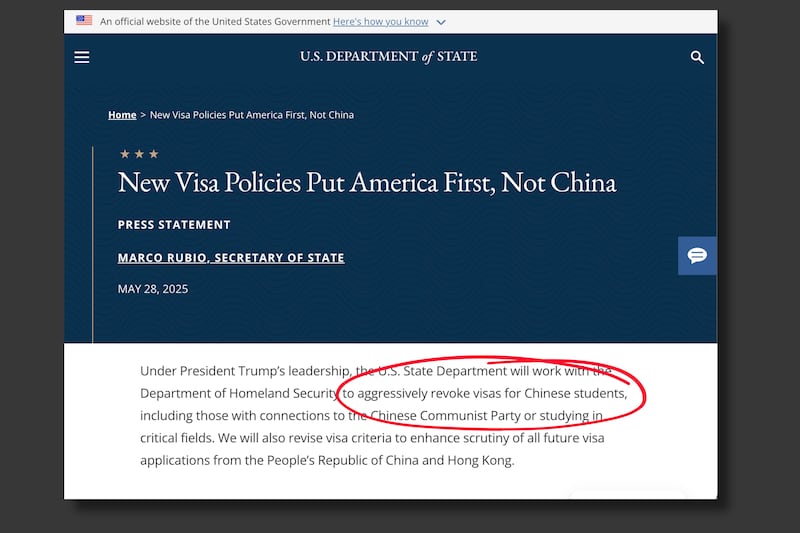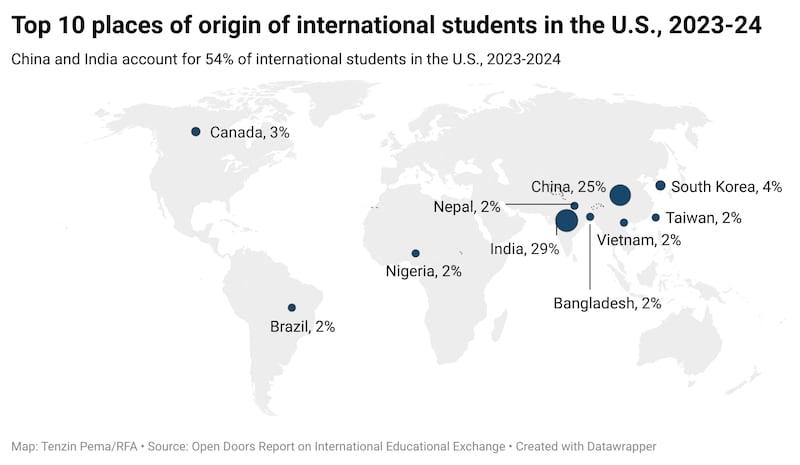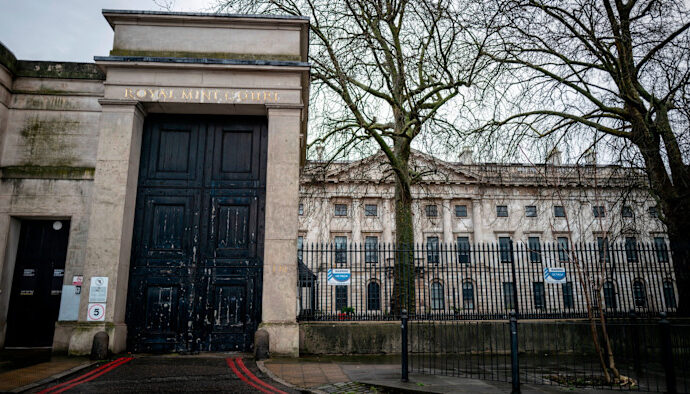Chinese students who account for about one quarter of overseas students in the United States voiced anxiety Thursday as the Trump administration paused visa interviews and announced tougher screening of applicants to American universities.
In the U.S., Chinese students expressed worries they may not be able to travel freely, and one student who is a human rights activist said she now felt pressure both from the Chinese government and U.S. government.
“The current situation in the U.S. feels increasingly uncertain — even dangerous,” Mary, who graduated from an American college this month, told Radio Free Asia. She requested a pseudonym for security reasons. “This dual threat is devastating,” she said.
In China, prospective students also took to social media to express confusion and distress after the U.S. Secretary of State Marco Rubio announced Wednesday that the U.S. will work “aggressively” to revoke visas for Chinese students, including those with connections to the Chinese Communist Party (CCP) or studying in critical fields.
The U.S. will also revise visa criteria to enhance scrutiny of all future visa applications from the People’s Republic of China (PRC) and Hong Kong, Rubio said, in a statement titled “New Visa Policies Put America First, Not China.”
U.S. lawmakers have long raised concerns about China acquiring access to sensitive technology and know-how through American colleges.
But China’s government said it “firmly opposes” the decision and has protested to the U.S. for using ideology and national security as a pretext for taking actions that are “fully unjustified.”
“This politically motivated and discriminatory move exposes the U.S. hypocrisy over freedom and openness. It will further damage the image and reputation of the U.S. itself,” Mao Ning, spokesperson for the Chinese government, said at a press briefing on Thursday.
Mao said the move “seriously hurts” the rights and interests of international students from China and disrupts people-to-people exchanges between the two countries.

Rubio’s announcement risks deepening tensions in a U.S.-China relationship already strained over trade.
It follows other steps by the Trump administration to deter international students, including ordering embassies to pause new student visa appointments amid enhanced social media vetting.
While the U.S. has only a few hundred students in China, Chinese students only rank behind India in their numbers in the U.S.
There were 277,398 Chinese students in the U.S. during the 2023-24 academic year, second to India, at 331,602, according to the U.S. State Department-sponsored “Open Doors report on International Educational Exchange”. Together, India and China accounted for 54% of all the international students, the report showed.
Rubio’s announcement on Wednesday generated hundreds of comments on Chinese social media platform Xiaohongshu, known as RedNote in English, including questions of what subjects of study would be impacted.
“Cognitive neuroscience, brain science, computational linguistics, biomedical engineering — are any of these considered critical fields?” asked one netizen named Nailong.
Rubio did not specify which fields were considered “critical.” Neither was there any clarification provided on what “connections to the CCP” would be scrutinized. It could account for a major chunk of China’s student body.
The Communist Youth League of China, for example, had around 75.32 million members aged 14-28 by end-2024, and roughly 2 million related organizations at schools, colleges, and universities, with around 98.5 million members.
Darkest moment
Mary, the human rights activist who just graduated in the U.S., said she was urgently reassessing her future career plans and was now considering seeking job opportunities abroad.
“For Chinese students, international students, and the entire education sector, this week may have marked a darkest moment,” Andrew Chen, Vice-Chair of China Member Interest Group at NAFSA, the Association of International Educators, said in a video posted on WeChat.
“But everyone must take responsibility for their own growth and future. Every family needs to make choices quickly — to improve their academic and employment abilities,” said Chen, who advised that Chinese students keen on pursuing further studies in the U.S. eschew defense-related majors and sensitive institutions within China.

Chinese students who are already in the U.S. should work to improve their profile “as fast as possible,” so they can find a job in the country more easily in the near future, he added.
On social media platforms, Chinese students currently based in the U.S. expressed worries they may not be able to travel freely amid the stricter visa measures.
“If you’re in the U.S., you can’t go home anymore. I miss home,” wrote one netizen, Chaochao, on RedNote.
Other Chinese nationals also expressed worries about their future. “Will this affect an EB-1 application?,” asked one netizen named QuQ, referring to a U.S. employment-based visa for people with extraordinary abilities in their respective fields.
According to NAFSA, a U.S.-based nonprofit association focused on international education, international students contributed $43.8 billion to the U.S. economy and supported 378,175 jobs during the 2023-2024 academic year.
For every three international students, one U.S. job is created and supported through spending by international students on accommodation, higher education, dining, retail, health, telecommunications, and transportation, it added.
The U.S. House Select Committee on the CCP welcomed Rubio’s Wednesday announcement. Chairman John Moolenaar on Thursday said, “America’s student visa system has become a Trojan horse for Beijing, providing unrestricted access to our top research institutions and posing a direct threat to our national security.”
“If left unaddressed, this trend will continue to displace American talent, compromise research integrity, and fuel China’s technological ambitions at our expense,” Moolenaar said.
Edited by Mat Pennington.


